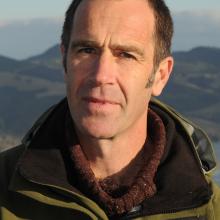

Every place has its stories that those who live there know and hold close. Those stories, whether told or just known, come from local knowledge which in turn comes from observation through the seasons and through our experiences. I am lucky enough to work for a place-based community organisation with its office in Waitati, where I also happen to live. Each day I walk to work along a track through the bush. I take notice as the seasons change. I notice when the ground is dry or muddy. I listen to the birds and look at how the bush is regenerating now that sheep and horses are fenced off from this particular patch.
From my office window I can see the school garden, and I notice the change in colour and particularly now, spring growth. I hear (more than see) children in the garden on Fridays learning about the soil, mulching, weeding; gaining life skills with Sally.
This is a daily, lived experience. But I also know that while the seasons change, now the climate is changing too, and this will have a profound impact on everything about us. For a decade now I have worked full-time at our trust on trying to provide climate solutions for our community and for future generations. I've waded through flood water, and rowed a boat across the flooded paddocks. I've helped with sand-bagging and with cleaning out flood debris from homes. Over time I've become increasingly aware of the realities of climate change and what this means for our community and indeed for communities all around New Zealand.

In many respects, Gilles' thesis, which looks specifically at Waitati and South Dunedin, is at the heart of the Climate Safe House project under way in Blueskin Bay. The Climate Safe House project is about preparing ourselves, materially and mentally, for managed retreat. Right now we at the Blueskin Resilient Communities Trust are working with a homeowner who is prepared to give up equity in an existing home in return for a warm, safe, efficient, transportable eco-home with low rental. It is about transferring private risk to a collective solution of climate-safe housing and it is about our relationship with place and community.
And "community" was one of the strongest themes that came through the climate change adaptation workshops run by the Blueskin Resilient Communities Trust earlier this year. Residents talked about the value of community and how residents need to be involved in any discussions about future action or responses. Too often the know-how of community members is overlooked by the very agencies that want to do good. Perhaps this is because community is made up of diverse voices, and with climate change comes emotional risk. As a recent Motu report on "Communities and Climate Change: Vulnerability to rising seas and more frequent flooding" points out, "individuals and families may also be emotionally affected through impacts on their livelihoods (e.g. their businesses, food gathering, or ability to access their employment); the costs of trying to restore their property after hazard events or to protect it from future events; the loss of wellbeing and comfort; and anxiety and uncertainty about future events".

With the spotlight now turning to social vulnerability we are likely to see more research and eventually policy interventions to help the most vulnerable. However, we do not need to wait for someone else to act on our behalf. Again and again residents have expressed a desire to be involved in decisions that affect them. Again and again residents have rolled up their sleeves and cleaned ditches, built walking tracks, retrofitted insulation in homes. All of this is what community is about too; connected and caring.
As BRCT's patron Jeanette Fitzsimons puts it, "communities are where people live, communities are where people work together, communities are where people know each other, and I think that is now the only solution; it is the only thing where people can start preparing for their future, creating their own future. It's not easy but everybody needs examples, needs models, needs demonstrations and Blueskin Bay can be a model of how you could do it, for other communities in New Zealand".
And to gear up for the changes ahead, communities need to be greater than simply individuals who live in the same area. This is where the power of place-based community groups comes in. By working at the flax-roots and forming a bridge with other agencies, by practising collaboration in fact, passion can be harnessed for the greater good, and can activate the good ideas so that they become practical action.
This is what we hope to do with the Climate Safe House project in Blueskin Bay. Most of us don't want to fatalistically accept what gets thrown at us. By working together, we can make the challenge an opportunity, and create solutions suitable to our place and our community. The stories we tell about our place will be stories about not only resilience, but also about experimentation, enterprise and endeavour.
For more
- Gilles Marciniak has provided a map with community quotes: https://bit.ly/2MBgbFi
- Motu report "Communities and Climate Change: Vulnerability to rising seas and more frequent flooding": https://bit.ly/2MTpOP0
- The Climate Safe House project: https://bit.ly/2wh05pQ
Scott Willis is the project manager of Blueskin Energy Ltd. Each week in this column, one of a panel of writers addresses issues of sustainability.











